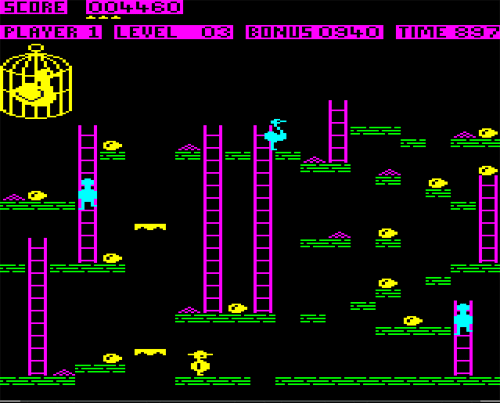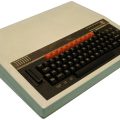What was the best version of the Chuckie Egg Computer Game?
The Chuckie Egg computer game caused a lot of arguments. Back in the 80’s my friend Jason and I would share time playing between my humble ZX Spectrum computer and his much more powerful (and expensive) BBC Micro. Many of the games that we played were exclusives to that platform, with few titles spanning both computers. At my house we would be playing games such as Manic Miner and School Daze, and at his house games such as Mr Ee! and Frak, There were some exceptions however, such as Yie Ar King Fu, which always gave rise to arguments about which one was best.
The biggest argument debate of all centred on Chuckie Egg, the classic platform game from A&F software that featured a farmer and some very grumpy chickens, battling out for farmyard supremacy. Both versions had their fans, as both were excellent games in their own right, but which version of this classic performer really was the best?
There’s only one way to find out……FIGHT!
Round 1 – Chuckie Egg Graphics
The graphics on the Beeb were always deemed better than the Spectrum, due to the bright colour palette and lack of attribute clash on the BBC Machine.
That said, the characters in the game were intentionally small, lending themselves to the Spectrum’s less colourful but higher resolution screen, with the Beeb version using the chunkier low resolution screen mode.
The animation on the Spectrum was incredibly smooth, with each jump forming a perfect arc, and the animation of the birds spot on, but this can also be said of the BBC version, which always managed to produce great scrolling graphics.
So for me that’s round one to the Spectrum, edged slightly into the win by the clarity of the graphics.
Round 2 – Chuckie Egg Sound
The Spectrum was always going to struggle with soudnd being it’s Achilles heel. The tiny internal beeper (speaker is probably too strong a word for it) had to fight for space with all of the Spectrum’s other internal parts, and could only emit a vague beeping noise on one measly sound channel. The BBC however had a great 4 channel sound chip and internal speaker, which allowed for great sound effects and some proper synthesised tunes.
As a consequence, many Spectrum games had no music at all, and Chuckie Egg was no exception. All the lowly Speccy could manage was a series of clicks and buzzes to accompany the action on screen. Strangely, given the greatly enhanced sound capabilities of the BBC, it was exactly the same as the Spectrum, almost as if the former had been programmed to mirror the latter.
So that’s has to be a draw, with a point for each, making the score 2-1 to the Spectrum.
Round 3 – Chuckie Egg Gameplay
Always going to be a tricky one this, as many people will have favourites based entirely on the game they played, as few people would have had access to Chuckie Egg on both machines at the time. Looking at this clinically, a replay is required of both games on the original hardware in order to make an informed judgement. I am lucky enough to possess both home computers, so no emulators for me… or at least that was the plan.
After a bit of messing around with cassettes and my trusty WHSmith tape player, which was part of the challenge of playing games back in the day, I gave this up as a bad job and fired up my PC to access the emulator software after all. Time had not been kind to the already sensitive tape and I couldn’t get either game to load via cassette.

Playing the games on a PC emulator is much simpler, and at least allows me to use a keyboard to control Henhouse Harry, as nature intended on the originals. First up the Spectrum version, and it’s not long before I have Henhouse Harry leaping about. The pace of the game is frantic, but due to the excellent collision detection you could leap onto ladders half way up, and clear gaps easily without having to the jumps perfectly – unlike arcade forebear Donkey Kong which was famously difficult to time your movement.
Playing Chuckie Egg on the BBC Micro
Playing the BBC Micro version straight after the Spectrum and it definitely feels different, but difficult to immediately put your finger on why. After a while, you realise that the BBC version actually has more realistic physics – Henhouse Harry’s jumps are subject to gravity as he decelerates when jumping up and accelerates when dropping down. This may be more realistic but it actually make timing jumps more easy on the Spectrum, with Harry maintaining a regular speed regardless of how high he jumps or how far he falls.
For this reason alone I find the Spectrum version of Chuckie Egg easier to play, as you get into the zone and zip through the many screens capturing eggs and avoiding the giant chickens.
So for me the third round also goes to the ZX Spectrum.
Verdict: 3-1 to the ZX Spectrum version of Chuckie Egg!
Despite the games playing in a very similar way, with virtually identical graphics and sound, the Spectrum just edges it for me, but the 3-1 score does not really do justice to the BBC Micro version, which was an excellent game and has many fans.
Perhaps my semi-scientific approach is not really appropriate when comparing these versions of Chuckie Egg – perhaps you are always going to favour the game you played as a kid, and for me my favourite will always be the Spectrum.






Great article, but I have to disagree! The BBC Micro version is perfect. The chunky graphics perfectly compliment the frantic, kinetic and tactile physics of the gameplay. But then nostalgia is clearly playing it’s part here. I had the Acorn Electron version as a kid, which is very similar, just less colourful iirc.
Like I said, my preference is probably tainted by my memory of playing on the Spectrum version as a kid! Thanks for the comment.
I believe that the BBC had 4 sound channels (3 wave, and 1 white noise); not 16 sound channels as you have said. Good review and comparison though.